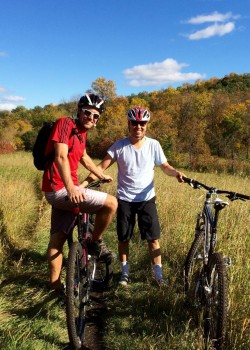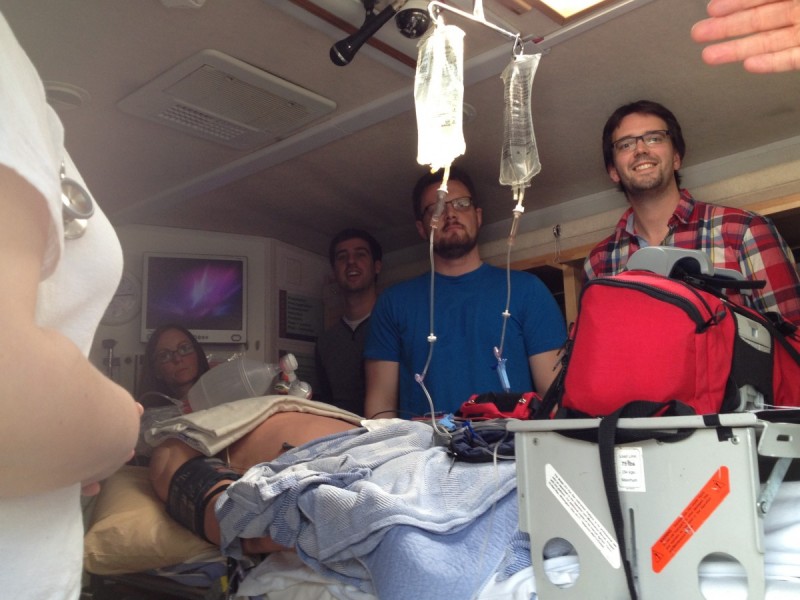
Photo by STEPHANIE ANSARI
Rural and northern residency profiles: learning medicine outside the perimeter
The University of Manitoba College of Medicine has been enhancing its distributed medical education model over the last five years. An increased number of residency positions in rural and northern communities has broadened the College of Medicine’s scope in providing training and practice opportunities for residents beyond the perimeter.
Family medicine distributed education sites have been expanded to 32 out of 57 family medicine residency positions including sites in northern Manitoba, Morden/Winkler, Brandon, Dauphin, Portage la Prairie and Steinbach. Effective July 1, 2015, Brandon will also host a specialty residency in anesthesiology.
Meet some of our recent graduates who are enrolled in rural and northern medicine residencies:
JASON ZHANG [MD/14]
 LOCATION: Morden/Winkler, MB (Boundary Trails)
LOCATION: Morden/Winkler, MB (Boundary Trails)
FOCUS: Rural family medicine, which includes a bit of everything – outpatient clinics, in-patient services, surgical assist, emergency medicine, obstetrics.
HIGHLIGHTS: Finding out that I matched to Boundary Trails rural stream was the highlight! It was my first choice, and I could not be happier. I rotated through Morden as a medical student and really liked the city, the people, the medicine, and the opportunities. In addition, getting to know patients and developing a longitudinal therapeutic relationship is very satisfying. In a rural community such as Boundary Trails, the level of continuity is unbelievable. For example, I’ve seen many patients in ER whom I’ve followed-up in the clinic after their visit and vice versa.
CHALLENGES: The most challenging aspect (and also the best part) of a family medicine residency is becoming competent in essentially all fields of medicine, from dermatology to psychiatry. One other challenging aspect is many programs require training in Winnipeg for certain specialties, as well as academic days in Winnipeg, so if the scheduling is scattered we have to move and travel quite a bit.
DIFFERENCES BETWEEN RURAL AND URBAN: Not only are there differences between rural and urban residencies, there are also small but significant differences among rural programs. Rural family medicine integrates certain specialties into family medicine training, which is reflected in actual practice. For example, many rural programs have emergency medicine training in parallel with family medicine training, where certain days of the week are set aside for work in the ER, which is reflective of actual practice in that many rural family physicians work both ER and clinic. In several rural family medicine programs, obstetrics, pediatrics, psychiatry, and internal medicine are also done in parallel, if not at the same site as family medicine, to achieve a more comprehensive rural training experience. Despite these differences, both types of programs offer very comprehensive training, in that rural programs may have elective time set aside for residents to experience northern and inner city family medicine, whereas urban programs have time set aside for rural family medicine. Both programs offer ample elective time to pursue any particular areas of interest.
IS RURAL PRACTICE IN YOUR FUTURE?: Absolutely, I have already signed on to practicing at Agassiz Medical Centre in Morden when I graduate.
STEPHANIE ANSARI [MD/13]
LOCATION: (Northern & Remote Stream) Our program serves all over Northern Manitoba and Nunavut: Garden Hill, Thompson, Rankin Inlet, Norway House, Churchill and Yellowknife have been the major locations for me.
FOCUS: Learning how to care for Northern populations and the specific challenges and rewards that come with that. Understanding the unique ways Manitoba offers care to its citizens living in remote communities and building a wide range of competencies to be able to provide care to these populations.
HIGHLIGHTS: It’s been amazing to be able to visit these areas of Canada which are often forgotten about or even ignored, and learn about the lives of the people who live there.
CHALLENGES: The challenges often come from the same things that I love about the program. Being in a place where you don’t know anyone, don’t know how things are usually done, don’t know what is and isn’t available to you and don’t understand the community or culture. Also knowing that in about a month, right after you have started to figure all those things out, you’ll be packing up and going somewhere new to learn it all again can be frustrating. But it teaches you to learn on your feet, be flexible, work in a team and trust your colleagues.
DIFFERENCES BETWEEN RURAL AND URBAN: I think rural residencies have a closer resemblance to the old general practitioner model. We really are taught to be a jack of all trades and to become comfortable and proficient with as much as possible, even in a setting where we may have little support as compared to someone working in an urban centre.
We don’t have the luxury of being able to send someone to a fully equipped emergency room for their care, we are the emergency room. At the same time, we need to be able to understand and recognize our own limitations and know when we need to ask for help, whether that be within the community or from a larger centre.
IS RURAL PRACTICE IN YOUR FUTURE?: I will definitely be working in a remote setting in the future. I wouldn’t want it any other way!
BRADY MURPHY [MD/13]
LOCATION: Steinbach, MB at the Steinbach Family Medical Centre as well as Bethesda Hospital. I also occasionally work at a few of the personal care homes in the area including Resthaven and Bethesda Place.
FOCUS: The focus of my residency is rural family medicine. Rural communities are commonly serviced exclusively by physicians trained as family practitioners so it’s important for us to be competent in many areas.
HIGHLIGHTS: One of the biggest highlights has definitely been the people. The physicians, staff and patients I have the privilege of working with every day have made this a fantastic experience. It’s also a huge privilege to provide obstetrical care for women close to home – I believe it’s really important for communities to offer that service.
CHALLENGES: I’m sure time management is a common challenge for residents in every program but being able to perform all my responsibilities to the best of my abilities and still maintain a relationship with my family at home has been something I’m still learning to do well. Keeping up to date with the literature and providing good evidence-based medicine is also challenging but also very important.
DIFFERENCES BETWEEN RURAL AND URBAN: Both the rural and urban programs provide excellent training for family medicine specialists but the rural programs do give some additional experiences that help to prepare physicians planning to practice in rural environments.
IS RURAL PRACTICE IN YOUR FUTURE?: Absolutely. I love the diversity of practice in rural medicine and the connections you make with your community make the job so rewarding. It would be much more difficult for me to have the kind of practice I want in an urban setting. I’m really enjoying living and working rurally and plan to make it a part of my future practice!
This story appeared in the Summer 2015 edition of MB Medicine Magazine.







